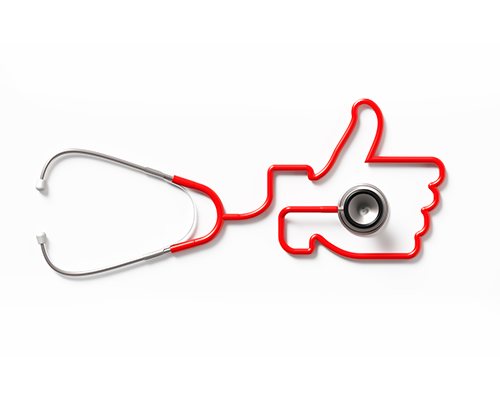
Imagine this: You’re going to bed after an evening out where you had a delicious surf and turf dinner and a glass or two of wine.1 One minute you’re sleeping soundly. The next, you wake up feeling like your big toe is being crushed and lit on fire all at the same time.1 What do you do? Some people suffer through the night and call their family doctor first thing in the morning. Others head straight for the emergency room or urgent care facility.2 But what happens after that? How do you manage gout long-term? And what is the best kind of gout doctor?
Get to know gout
Gout is a common form of inflammatory arthritis.1,3 It can develop as a result of excess uric acid in the bloodstream.1 As the uric acid builds up, urate crystals can begin to form around a joint.1 Occasionally, these urate crystals can trigger the swelling, redness and excruciating pain you know as a gout attack, or flare.1 A number of factors, including heredity, diet and certain medications, can contribute to your risk of developing gout and the likelihood of gout flares.1 More than nine million Americans suffer with gout.4
Start with your family doctor
After you are first diagnosed with gout, your family doctor or primary care physician (PCP) will probably manage your condition, at least in the beginning.5 He or she will most likely monitor your uric acid level and prescribe medication.5 Your doctor may recommend lifestyle changes as well.6 If your gout persists and you experience frequent gout attacks, however, your doctor or may refer you to a rheumatologist.5 A rheumatologist is a doctor who specializes in the management of joint problems such as gout, and thus is what many people would consider a “gout doctor.”7
Consider expanding your care team
To get the best care, people who suffer with gout and other health issues may require treatment from multiple doctors.5 If you suffer with both gout and kidney disease, for example, you might see a rheumatologist and a nephrologist (kidney specialist) in addition to your family doctor or PCP.5 It is very important for each of your doctors to know how the others are helping you manage your gout and other health concerns. Be sure to mention any significant changes to your health or medications at each of your doctor visits.
Take gout seriously
Gout is a serious disease, but only about 10 percent of the people who suffer with it receive the ongoing treatment they need.3 If not properly treated, gout can result in permanent joint damage.3 This damage, plus the development of large tophi (urate crystal deposits that can form under the skin around a joint), can lead to deformities.3 These deformities, often of the feet and hands, can result in the loss of normal use.3 Furthermore, gout and uric acid levels that are higher than normal have been linked to other serious health conditions including kidney disease, diabetes, heart attack and stroke.7,8
Make the most of your gout doctor appointments
Regardless of the kind of gout doctor you see, it’s important to make the most of every appointment. Whether you’re meeting with your family doctor or PCP because you suspect you have gout or are visiting a rheumatologist for the first time because your gout has become more severe, consider the following tips to help you prepare6:
- Download and complete the Gout Flare Questionnaire (from Resources for Patients) prior to your appointment
- Make a detailed list of your symptoms, including what, if anything, appears to cause them
- Write down your key medical information, including:
- Any family history of gout
- Other health issues for which you are receiving treatment
- The names of any medications or supplements you’re taking
- Make a list of your questions and concerns you may have about gout
You may also consider asking a family member or friend to join you for your appointment. They can take notes so you can focus on your conversation with the doctor, and may even remember details that you forgot about when the visit is over. A friend or family member can also be a great source of moral support.
Mitigare® is a registered trademark of Hikma Pharmaceuticals USA Inc.
Colchicine 0.6mg capsules are contraindicated in patients with renal or hepatic impairment who are currently prescribed drugs that inhibit both P-gp and CYP3A4. Combining these dual inhibitors with colchicine in patients with renal or hepatic impairment has resulted in life-threatening or fatal colchicine toxicity. Patients with both renal and hepatic impairment should not be given Mitigare®.
Fatal overdoses have been reported with colchicine in adults and children. Keep Mitigare® out of the reach of children.
Blood dyscrasias such as myelosuppression, leukopenia, granulocytopenia, thrombocytopenia and aplastic anemia have been reported with colchicine used in therapeutic doses.
Monitor for toxicity and, if present, consider temporary interruption or discontinuation of colchicine.
Drug interaction with dual P-gp and CYP3A4 inhibitors: Co-administration of colchicine with dual P-gp and CYP3A4 inhibitors has resulted in life-threatening interactions and death.
Neuromuscular toxicity and rhabdomyolysis may occur with chronic treatment with colchicine in therapeutic doses, especially in combination with other drugs known to cause this effect. Patients with impaired renal function and elderly patients (including those with normal renal and hepatic function) are at increased risk. Consider temporary interruption or discontinuation of Mitigare®.
The most commonly reported adverse reactions with colchicine are gastrointestinal symptoms, including diarrhea, nausea, vomiting and abdominal pain.
Please see the full Prescribing Information and Medication Guide for Mitigare® for complete product details.
NOTE: This article was not written by a medical professional and is not intended to substitute for the guidance of a physician. These are not Hikma’s recommendations for gout flare prevention, but rather facts and data collected from various reliable medical sources. For a full list of resources and their attributing links, see below.
